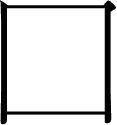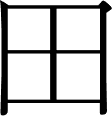Genesis 2:8-9 NIV8 And the Lord God planted a garden eastward in Eden; and there he put the man whom he had formed.9 And out of the ground made the Lord God to grow every tree that is pleasant to the sight, and good for food; the tree of life also in the midst of the garden, and the tree of knowledge of good and evil.10 And a river went out of Eden to water the garden; and from thence it was parted, and became into four heads.11 The name of the first is Pison: that is it which compasseth the whole land of Havilah, where there is gold;12 And the gold of that land is good: there is bdellium and the onyx stone.13 And the name of the second river is Gihon: the same is it that compasseth the whole land of Ethiopia.14 And the name of the third river is Hiddekel: that is it which goeth toward the east of Assyria. And the fourth river is Euphrates.
I am working on a Westernized description of Whitehead's process philosophy and theology. However, it is a pervasive concept as old as the world itself and in the East, such as in China, the religion of Buddhism also has this center of being-ness and becoming-ness. I wish then to use it as a common ground of understanding with Asia and to build upon it Christ and His Salvation known. - re slater
1) The Garden of Eden (Genesis 2:10-14)
God did not create a garden but ‘planted’ one. But note, the garden is not Eden. The garden was in in the eastern section of Eden (towards the rising sun). Eden was not itself a garden but a fairly large district. The Hebrew word ‘Eden’ means pleasure or delicacy. If Eden was pleasurable, the garden must have been exquisite. Where are those people who talk about the Old Testament God being fierce?! God has never changed from His goodness.
We are surprised at the space taken to describe the rivers. Only one verse is used to describe man’s creation (2:7), but five are used to describe the river. There is a hidden message here.
One river flowed out from Eden. Either it was a spring that came from the ground or a tall mountain stream that flowed down to the garden. Once the river reached the center of the garden, it divided itself into what would become four huge rivers. This would necessitate a huge garden. The names of some of the rivers are familiar to us; others are not. We suspect they are the same but necessary.
- River #1 was Pishon: flows around Havilah where there is good gold, bedllium and onyx stone.
- River #2 was Gihon: Flows around Cush (Ethiopia)
- River #3 was Tigris: Flows east of Assyria
- River #4 was Euphrates.
There are two Chinese characters for garden. One describes the garden above with its four rivers. The other describes the garden’s occupants.
 Enclosure | The enclosure has a center from where the river flowed and divided into four rivers. |  Garden, Field | |||
This Chinese word for garden or field describes what the garden was like. The Hebrew word for garden comes from the word to 'enclose' or 'protect.' | |||||
 Enclosure | Dirt |  Mouth, breath | Two people | ||
A second Chinese word for garden describes who lived there. Only two people.God spoke and formed man from the ground. Eve, the second person, came from the side. | |||||
So perhaps the whole of Eden was in a lofty place, but the garden was at a lower plateau where the rivers would gain more momentum as they flowed on out of Eden to the other parts of the world. Because of the identity of the Tigris and Euphrates Rivers, we suppose this land was near the present day rivers. The whole land of Eden seemed central and all the known world was centered around it. We see one river flowing from God’s new paradise.
The river stood for the blessing that came from God and would bring enriching provisions to the world. One could easily see how the Garden would seem like the throne of the world subjected to a higher throne in heaven. This thought of God’s divine blessing flowing to earth from His above throne is very common in scripture (see Psalm 65:9-13).
And he showed me a river of the water of life, clear as crystal, coming from the throne of God and of the Lamb, (Revelation 22:1).
| Chinese description of Eden |






